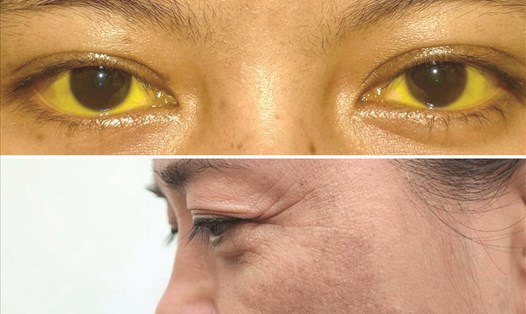Patient V.D.P. was admitted to the Central Hospital for Tropical Diseases with severe headaches, continuous high fever, vomiting and impaired consciousness. Previously, the patient was treated at a provincial hospital with a diagnosis of bacterial meningitis but did not improve, even getting worse. After a week of antibiotic treatment, the patient had a continuous fever of 3940°C, severe headaches and gradually fell into a state of drowsiness, at risk of a deep coma and having to use a ventilator.
As soon as it was transferred to the Emergency Department, the Central Tropical Diseases Hospital, the patient was poked with cerebrospinal fluid and conducted intensive tests. The result of dyeing cerebrospinal fluid with ink detects cryptococcus - a mushroom that can cause meningitis in humans immunodefits. At the same time, the signs of jaundice, ascites, vessels ... show that the patient is in the stage of severe progressive cirrhosis, serious weakened immune system.
According to MSc. Dr. Nguyen Kim Anh - Emergency Department, fungal meningitis is a rare but extremely dangerous disease, especially in people with weakened immune systems such as patients with cirrhosis, HIV/AIDS, diabetes or taking immunosuppressants. In this case, the main cause is cirrhosis caused by alcohol.
The major difficulty in treating anthritis caused by fungi is that antifungals are very difficult to penetrate through the blood-brain barrier, the rate is only about 1-2%, so even if diagnosed correctly, the prognosis is often severe said Dr. Kim Anh.
Thanks to early detection and a specific antifungal treatment regimen, after 10 days of active treatment, the patient recovered significantly: was completely alert, had no fever and had less headaches - a rare result in cases of severe myasthenia gravis.
Cryptococcus fungus exists in natural environments, especially soil and water contaminated with pigeon manure or moldy areas. For healthy people, the immune system can control the invasion of fungi, but in people with weakened immunity, this type of fungus can attack the cerebral Principles, causing dangerous diseases.
Notably, the patient has a history of frequent exposure to livestock environments with turkeys - a common source of Cryptococcus infection. However, not everyone exposed to this environment get sick, only people with weakened immunity are at high risk.
Because the disease shows similar symptoms to many other infections, early diagnosis requires doctors to conduct a brain-marrow disease test - which is not easy to do at the grassroots level. Fungal meningitis, if not detected and treated promptly, has a very high mortality rate.
Doctor Kim Anh recommends: "People with symptoms such as prolonged headaches, high fever of unknown cause, vomiting, and impaired consciousness - especially if they have underlying diseases - need to go to a specialized medical facility for timely examination. The earlier it is detected, the higher the chance of treatment.
Currently, there is no vaccine or specific vaccine for fungal meningitis. Doctors recommend that people with weakened immune systems should have regular health check-ups, be vigilant for unusual signs and limit exposure to humid environments, bird manure or dirty soil to reduce the risk of disease.






